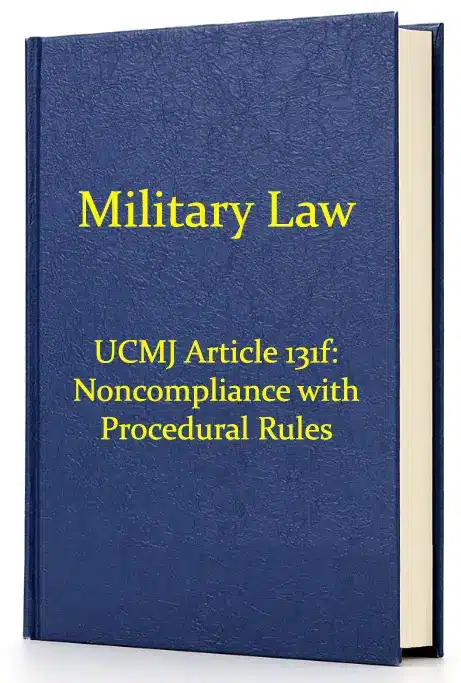Article 131f of the MCM states any service member may be subject to prosecution if they are responsible for an unnecessary delay in the disposition of any case of a person accused of an offense or if they knowingly and intentionally fail to enforce or comply with any provision regulating the proceedings before, during, or after trial of an accused.
To be convicted of an Article 131f Unnecessary Delay in Disposing of a Case violation, the prosecution must demonstrate that:
-
the accused was charged with a specific duty in connection with the disposition of a case of a person accused of an offense under the UCMJ;
-
the accused knew that the accused was charged with this duty;
-
delay occurred in the disposition of the case;
-
the accused was responsible for the delay; and
-
under the circumstances, the delay was unnecessary.
To be convicted of Article 131f Knowingly and Intentionally Failing to Enforce or Comply with Provisions of the UCMJ violation, the prosecution must prove that:
-
the accused failed to enforce or comply with a specific provision of the UCMJ regulating a proceeding before, during, or after a trial;
-
the accused had the duty of enforcing or complying with that provision of the UCMJ;
-
the accused knew that the accused was charged with this duty; and
-
the accused’s failure to enforce or comply with that provision was intentional.
Understanding Article 131f (Noncompliance with Procedural Rules) of the UCMJ
The unnecessary delay in disposing of the case section of Article 131f is to ensure expeditious disposition of cases of persons accused of offenses under the UCMJ. A person may be responsible for delay in the disposition of a case only when that person’s duties require action concerning the disposition of that case.
The section knowingly and intentionally failing to enforce or comply with provisions of the UCMJ in Article 131f is designed to punish intentional failure to enforce or comply with the requirements of the UCMJ regulating the proceedings before, during, and after trial. Unlawful command influence under Article 37 may be prosecuted under this Article. However, errors made in good faith before, during, or after trial do not apply to Article 131f.
Maximum Possible Punishment for Violations of Article 131f
Service members convicted of an Article 131f violation for Unnecessary Delay in Deposing of Case face the maximum possible punishment of a bad conduct discharge, forfeiture of all pay and allowances, and confinement for six months.
Those convicted of an Article 131f violation for Knowingly and Intentionally Failing to Enforce or Comply with the provisions of the UCMJ face the maximum possible punishment of a dishonorable discharge, forfeiture of all pay and allowances, and confinement for five years.
How do you defend against Article 131f Noncompliance with Procedural Rules charges?
When facing the combined resources of the military and the current cultural climate, you need to be prepared to defend your career and your freedom. Crisp and Associates, LLC has a team of experienced trial attorneys with over 75 years of combined experience who have won these cases. This team includes the firm’s founder, Jonathan Crisp, a highly respected and sought-after attorney, speaker, and lecturer who has served in the U.S. Army Judge Advocate General’s Corps (JAG) since 1998 and entered private practice in 2007.
If you, or someone you know, is facing Article 131f charges for Noncompliance with Procedural Rules, you need to speak with a Military defense attorney immediately. We understand what is at risk and know how to protect your career, freedom, and future.charged with


